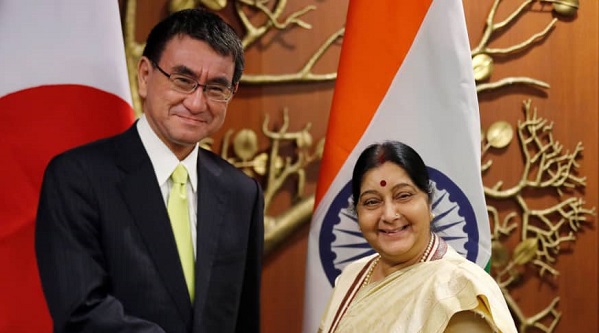India and Japan launch “2+2” talks
January 10, 2019 | Expert Insights

Japan and India will aim to launch ministerial security talks early this year to deepen cooperation in fields such as space and cyberspace, Japanese Foreign Minister Taro Kono said.
Background
India and Japan, two of the largest and oldest democracies in Asia, having a high degree of convergence in polity, economy and strategic matters, view each other as partners that have responsibility for, and are capable of, responding to global and regional challenges. India is the largest recipient of Japanese official development assistance (ODA). As of 2013, bilateral trade between India and Japan stood at US$16.31 billion and is expected to reach US$50 billion by the fiscal year 2019-20.
India and Japan traditionally have strong ties with one another. The two nations have become closer in recent years in order to counter the rise of China. Japan’s foreign direct investment in India has risen since the global financial crisis, reaching nearly $3.5 billion in 2016. Japan is India’s 10th largest trading partner with the bilateral relationship worth about $14.5 billion.
Japan has the technological know-how and several large corporations are looking to access new markets. For the Japanese with a shrinking population at home, India offers a large market for its high-quality products.
Analysis
Prime Minister Shinzo Abe and his Indian counterpart, Narendra Modi, agreed at their October meeting in Tokyo that they will upgrade the existing “two-plus-two” framework, which operates at the vice-ministerial level, to the ministerial level.
“We will launch and proceed with (ministerial security) talks between Japan and India,” Kono told reporters after his meeting in New Delhi with his Indian counterpart, Sushma Swaraj. The summit was the 12th between Abe and Modi, as Japan and India seek to bolster bilateral economic and security relations at a time of China’s growing influence in Asia.
Abe has stated that he aims to realize a free and open Indo-Pacific region based on the freedom of navigation and rule of law. During the foreign ministers’ meeting, Kono and Swaraj also exchanged views on regional issues such as the denuclearization of North Korea. Kono also expressed Tokyo’s determination to conclude the Regional Comprehensive Economic Partnership, a free trade agreement among 16 countries including Japan and India, during this year. Kono also held talks with Modi to discuss ways to promote personnel exchanges between Japan and India.
India and Japan’s renewed commitment for cooperation space can be traced back to March 2018 when they launched the bilateral Space Dialogue. The countries intend to cooperate not only on lunar exploration but also security, including surveillance sharing. India, Japan and other space-faring countries are waking up to a harsh reality: Earth's orbit is becoming a more dangerous place as the U.S., China and Russia compete for control of the final frontier.
Growing fears that satellites could be threatened by newfangled space weapons or sophisticated hacking, are forcing governments to think of their space programs not just as scientific endeavors but as pressing national security concerns.
India has established itself as a player in the budget satellite business. It even put a probe into orbit around Mars in 2014, in a U.S.-assisted project that cost just $76 million. But it is scurrying to enhance its ability to monitor China's activities, and the partnership with Japan is part of this.
Another sign that space is becoming a defence focus for India came on December 19 2018, when the country launched its third military communications satellite, the GSAT-7A. The satellite will connect with ground-based radar, bases and military aircraft, along with drone control networks.
Japan, for its part, had space in mind when it published new national defence guidelines in December. Defense Minister Takeshi Iwaya told reporters at the time that space, cyber and electromagnetic pulse, or EMP, attacks were major concerns in a security environment that is evolving with "extraordinary speed." All of this comes amid an intensifying technological race between the U.S. and China.
Kono, who visited India for the first time since assuming the post in August 2017, also met separately with Modi and agreed to deepen bilateral ties. India was the first stop for Kono on a trip that will also include Nepal, France and Russia.
Assessment
Our assessment is that India and Japan are pooling their resources to counter challenges in the Indo Pacific region. We believe that both countries may work together to soften disruptions in the supply chain caused due to the ongoing trade war. We feel that the technological prowess of Japan and the immense market potential in India could be a good stimulus for enhanced collaboration.








Comments